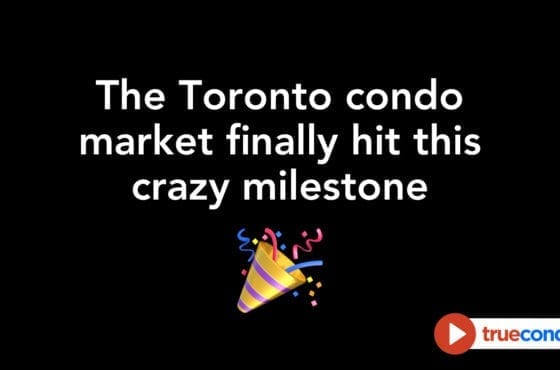Is renting really cheaper than owning?

Market Watch Feb 2017 Stats
Toronto Real Estate Board President Larry Cerqua announced that Greater Toronto Area REALTORS® reported 8,014 residential sales through TREB’s MLS® System in February 2017.
Sticker shock sets in
Thirtysomething buyers confronted with $1-million entry-level homes are left in the lurch

Why Toronto's condo rental market is described as 'ridiculous'
‘Fierce’ competition for few units pushes prices higher as hot housing market keeps millennials in rentals

Soaring rents still cheaper than owning a house
Buying a home is not the answer to insanely expensive rent.

Son is back to couch surfing at mom's after condo buy goes south
Lawyers say there are few options when floor plan doesn’t match finished product.
TRANSCRIPT
Today is Monday, March the 6th, and this is what’s happening in the condo market this week. Thanks for checking out this video and joining along with me once again. The big news from the past week is we’re in the beginning of a new month. As is often the case, the new stats came out from the Toronto Real Estate Board from the previous month, the month of February, and as expected, the numbers are through the roof. The numbers are consistent with what we’ve been seeing. Sales and prices are up in high double digits.
I’ll put some of these numbers up on the screen here, you can take a look with me. The average price across all properties is up about 28%. The biggest reason for that is the supply. Again, the supply is ridiculously low. Supply side we are down 50% from the supply amount last year. So the amount of homes available for sale last year versus this year, we’re down 50%. If you look at the condo stats specifically, condos are up. Sales are up 16%, and prices are up 19%. More accurately, if you look at on a price per square foot basis, prices are up about 25% over last year, according to condos.ca.
Market is crazy hot, everybody obviously is interested in this and wondering what’s driving this, what’s going on. Again, like I said, the biggest thing is the lack of supply. There’s just nothing available to buy. This is sort of a self-fulfilling snowball effect in a market like this where the market is going up really quickly. It paralyzes people, and people don’t want to move, they don’t want to sell. People tend to stay in place because moving has become so expensive and it’s so stressful and it’s so hard to find anything that people who would otherwise naturally make a move are not, and they’re staying in place, and they’re sort of taking a wait and see approach. That further restricts supply and makes things even worse.
Again, what I keep telling people and condo investors is, this is not normal. Don’t expect this trend to continue long term. If you’re already in the market, it’s great. The value of your assets are taking a big jump forward this year. But at some point this is going to cool off. At some point we are going to go back to normal levels. Again, over the long term, five, ten year period, 5% appreciation is what you should expect or what is sort of normal. Not 15, 20, 25%. That is not normal. Don’t get used to that.
I do expect the change to happen at some point this year. The market will cool down. We can’t keep this up. It’s not a long term sustainable pace. What’s going to cause it to actually slow down a little bit? I don’t know. There’s a lot of speculation out there. Maybe the government will have to step in and do something to sort of force the market to change. We’ll have to see. But it’s not going to continue like this forever, so don’t get used to that.
Again, around this continuing rent hot market, there’s all kinds of headlines coming out every day. “Sticker shock sets in.” Here’s one from Logan Mail. Sticker shock, the prices are shocking people. The rental market, again, the rental market, here’s an article from the CBC, the rental market is also very, very hot, which is interesting. Usually it’s either one or the other, but the sales and the rental side are both hot. Preconstruction and resale. Everything is hot. The whole market is really moving forward. The CBC continues to do these articles about the rental market specifically. “Why Toronto’s condo rental market is described as ridiculous” is the headline here. “Fierce competition for new units pushes prices higher as hot housing market keeps millennials in rentals.”
Again, I think the biggest thing that happened was the mortgage rule changes that the government brought in in October 2016, and that basically created a massive new influx of condo buyers. People who were going to buy houses are now buying condos, and it also created a massive new influx of renters. People who were just on the edge of being able to buy a condo or maybe a starter home, and now they can’t, and so now they are re-entering the renter pool. The rental market has really taken off as well over the past few months. For every action, there’s an equal and opposite reaction, so whenever the government does step in, artificially constraining the market in some way, the market will naturally move into a different area and it will compensate for whatever those changes are. I’m not a big fan of government intervention for that reason. I do believe in free market, but at the same time I understand that sometimes the government does have to step in when markets are going too far one way or the other, it’s bound to happen. But there’s always an opposite counter-reaction when that happens.
The next article on the rental note is something that I love to see. Anytime I see a headline like this I say, “Yes. Keep preaching it, man.” This is, “Soaring rents still cheaper than owning a house.” Basically, it’s a pro-rental article telling people that you should rent. It’s better to rent than own. As a condo investor, and as condo investors, you should love it when you see articles like this. Send this to your tenants if you have them. Say, you know, “Keep doing a good thing. Renting is, there’s nothing wrong with it.” That’s true, obviously. There is nothing wrong with renting, of course.
But this belief that renting is cheaper than owning, of course, we as condo investors who are getting positive cash flow on all of our properties, we know this is not true. All of our properties, it’s cheaper to own them for us than it is to rent them out, because we’re charging more. We’re getting more in our pocket every month, right? What I would say is, if you look at the average condo, and if you look at the average rental, and you do the math on that, then yeah, it’s probably better to rent than it is to own.
But again, we as condo investors and my whole philosophy that I’ve always worked with and I teach all my clients is, we do not buy the average condo. We buy the condo that nobody else sees. We ignore the 95% of the market, and we look for that 5% very small portion of the market that will give us a positive cash flow with the traditional 20% down. When we do that, we’re making money, and we’re making very healthy returns on our investments. It’s certainly much better to own them than it is to rent them, because we know how to pick the right condos, and that’s what I can teach you as well. If you’re new to this video series and to True Condos, that’s what we do.
Finally, the last article is also from the CBC, and it’s “Son is back to couchsurfing at Mom’s after condo buy goes south.” Again, a common story that we see from time to time. Basically another one that the media likes to jump on and gets a lot of clicks and a lot of eyeballs. Occasionally a condo, somebody who buys a preconstruction condo, the finished product is not matching quite with what they thought they were buying with the floor plan. It’s a consumer protection sort of angle.
I’m not going to comment on the validity of this person’s complaint, whether they’re right or wrong, whether the developer’s right or wrong. I have no idea. But all I’d like to say about it is that as condo investors, these kind of details really don’t matter to us. Whether our condo that we get on delivery, it ends up having a gray countertop instead of a white one that we chose, or whether instead of 500 square feet it’s actually 495 square feet. Things like that. Maybe there’s a few deficiencies in the unit, and it needs to be patched up over the first year after you’ve gotten it from the developer.
These kind of details we don’t care about as investors. All we care about is, did we make money? Did our condo appreciate? Did the rental market appreciate? Is it rented out? Are we getting positive cash flow? Are we making money? If we are, then great. It’s achieved. We’ve got the result that we wanted. But a lot of people who are new to condo investing or thinking about getting into condo investing, they see these articles, they see these headlines, and they say, “See? See? That’s why I’m not gonna buy a condo, because it’s gonna be a mess, and the developers are all shady, and they’re gonna give me a terrible product. It’s not gonna be what I thought I bought on the floor plan.”
Again, what I would say to you if you’re thinking along those lines is, it doesn’t matter. You’re buying as an investment. You’re never going to live in the unit. It doesn’t affect you in any way. 99.9% of the time, if there is any deficiency or problem or anything with the unit, it’s not going to affect your return on your investment in any way either, right? Let’s keep that in mind as we see these articles, and again, it’s nothing to worry about as a condo investor. Let’s face it, you can alleviate any of these issues if you’re buying from the developers that we recommend to you, developers that have a great track record, that are going to give you a product that’s as good or even better in some cases than what you thought you were going to get.
Okay, that’s it for the condo market this week. I hope you enjoyed the video. If you did, why don’t you go ahead and share this with somebody that you know or share it on Facebook or on social media? Until next time, we’ll see you next week.



